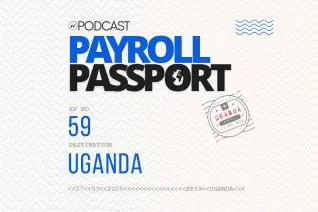Country Spotlight: Payroll in Dominican Republic

The Dominican Republic isn’t just about pristine beaches, lively merengue beats, and breathtaking landscapes; it’s also one of Latin America’s fastest-growing economies. With a strategic location, investor-friendly policies, and a thriving business ecosystem, the country has positioned itself as a key destination for global enterprises. Foreign investments are pouring in across industries like tourism, manufacturing, and technology, creating a dynamic and competitive market.
Yet, expanding into the Dominican Republic isn’t just about seizing opportunities; it’s about navigating complexities. One of the most critical aspects businesses must master is payroll management. From complying with tax regulations to ensuring employees receive their well-earned benefits, understanding Dominican payroll laws is essential for businesses aiming for smooth, long-term success. Let’s break it down.
Business Entities and Registration
Expanding into the Dominican Republic starts with laying the right foundation. Before hiring employees or operating legally, businesses must establish a registered presence that aligns with local corporate structures. The country offers business-friendly options for different company sizes and needs:
- Limited Liability Company (S.R.L.) – Ideal for small to medium-sized businesses.
- Joint-Stock Company (S.A.) – Suitable for larger enterprises.
Employers must register with the Dirección General de Impuestos Internos (DGII) for tax purposes and the Tesorería de la Seguridad Social (TSS) for social security contributions.
Employment Laws and Regulations
Managing employment regulations in the Dominican Republic requires deep local expertise, particularly regarding working hours and overtime compensation. For instance, navigating the 44-hour standard workweek requires careful attention to overtime calculations at 135% of base pay, along with distinct night and mixed shifts rules. Even straightforward requirements like mandatory one-hour meal breaks can create compliance challenges when managing a global workforce.
ALSO READ | Dominican Republic: A Guideline to Payroll and Employer of Record
Payroll Compliance: Record-Keeping & Reporting
Employers in the Dominican Republic must maintain detailed payroll records, including employee contracts, payroll summaries, attendance logs, and severance reports. These records must be retained for at least 10 years as required by the Dominican Tax Authority (DGII) and the Ministry of Labor.
Digital Compliance & Reporting
The country is moving toward electronic payroll reporting, requiring businesses to:
- Submit payroll reports to the Social Security Treasury (TSS) for wage and contribution details.
- File monthly reports with the DGII for income tax and withholding compliance.
- Use the electronic invoicing system (e-CF) if applicable, ensuring payroll records align with tax regulations.
Audit & Inspection Readiness
Labor authorities conduct random audits to verify compliance, with penalties for inaccuracies or missing records. Companies using automated payroll systems benefit from faster reporting, improved accuracy, and reduced compliance risks.
Taxation, Social Security Contributions, and Compensations
Navigating the Dominican Republic's complex tax and compensation landscape demands specialized knowledge and constant vigilance. Consider the intricate web of requirements: progressive income tax rates for earnings over DOP 416,220, distinct employer contributions (7.1% for pensions, 7.09% for health insurance), and employee deductions (2.87% and 3.04% respectively). Add to this the variable minimum wage structure based on industry and company size, and the complexity becomes clear.
Rather than managing these complexities internally, businesses benefit from having a dedicated partner who understands the nuances of local regulations and can adapt quickly to changes in tax rates, social security contributions, and minimum wage requirements. This expertise not only minimizes compliance risks but also ensures fair compensation practices that help attract and retain top talent in the Dominican market.
Employee Benefits & Payroll Considerations
Employers in the Dominican Republic must account for mandatory benefits such as the Sueldo de Navidad (13th salary), 14 days of paid vacation after one year of service, 14 weeks of maternity leave, and two days of paternity leave. Public holidays are regulated, and shifts on these days may require premium pay. To ensure compliance and financial stability, businesses should:
- Budget for mandatory bonuses and leave entitlements, particularly the tax-exempt Christmas bonus in December.
- Adhere to evolving labor laws, such as potential adjustments in social security contributions or leave policies.
- Ensure proper record-keeping for payroll audits, as the Ministry of Labor mandates documentation of wages, benefits, and deductions.
- Use automated payroll systems to streamline tax reporting, holiday pay calculations, and compliance with the Dominican Social Security System (TSS).
With strict payroll regulations and frequent labor law updates, employers in the Dominican Republic must maintain diligent payroll management to avoid fines and retain a satisfied workforce.
TUNE IN | Payroll Passport Ep 19. Dominican Republic
Payroll Challenges: Key Considerations for Employers
Managing payroll in the Dominican Republic comes with unique challenges that employers must navigate carefully:
- Compliance Pitfalls – Frequent labor law updates, mandatory benefits, and strict tax regulations require continuous monitoring. Failure to comply can result in penalties and legal disputes.
- Complex Taxation & Social Security Contributions – Employers must correctly calculate and report deductions for pensions, health insurance, and education funds while ensuring timely payments to the Dirección General de Impuestos Internos (DGII).
- Technology Adaptation – Many businesses still rely on manual payroll processes, increasing the risk of errors and inefficiencies. Transitioning to digital payroll solutions can improve accuracy and compliance.
- Cultural Considerations – Payroll expectations, such as the Sueldo de Navidad (13th salary) and timely salary payments, are deeply ingrained in workplace culture. Delays or miscalculations can impact employee satisfaction and retention.
Why choose Neeyamo for your Global payroll needs?
Unlock the power of seamless global payroll management with Neeyamo's expert global payroll services. Neeyamo helps you navigate complex payroll regulations in 160+ countries, ensuring compliance and minimizing risks. Not convinced yet? Here's why we're your ideal partner:
Regulatory Roadblocks? Confidently navigate complex international laws & regulations.
Irritated with Integration? Seamlessly stitch together your HR systems.
Chaotic Control? Command your global workforce from a single platform.
Tardy Transactions? Ensure prompt and precise payroll processing.
Doubtful Digital Defense? Shield your sensitive information from digital threats.
Neeyamo? Your passport to hassle-free global payroll!
As you expand your business in Italy, remember that a happy and well-compensated workforce leads to a thriving business. For more information, contact irene.jones@neeyamo.com.
Latest Resources
Stay informed with latest updates
If you're curious and have a thirst for knowledge pertaining to the HR, payroll, and EOR universe, don't miss out on subscribing to our resources.

















